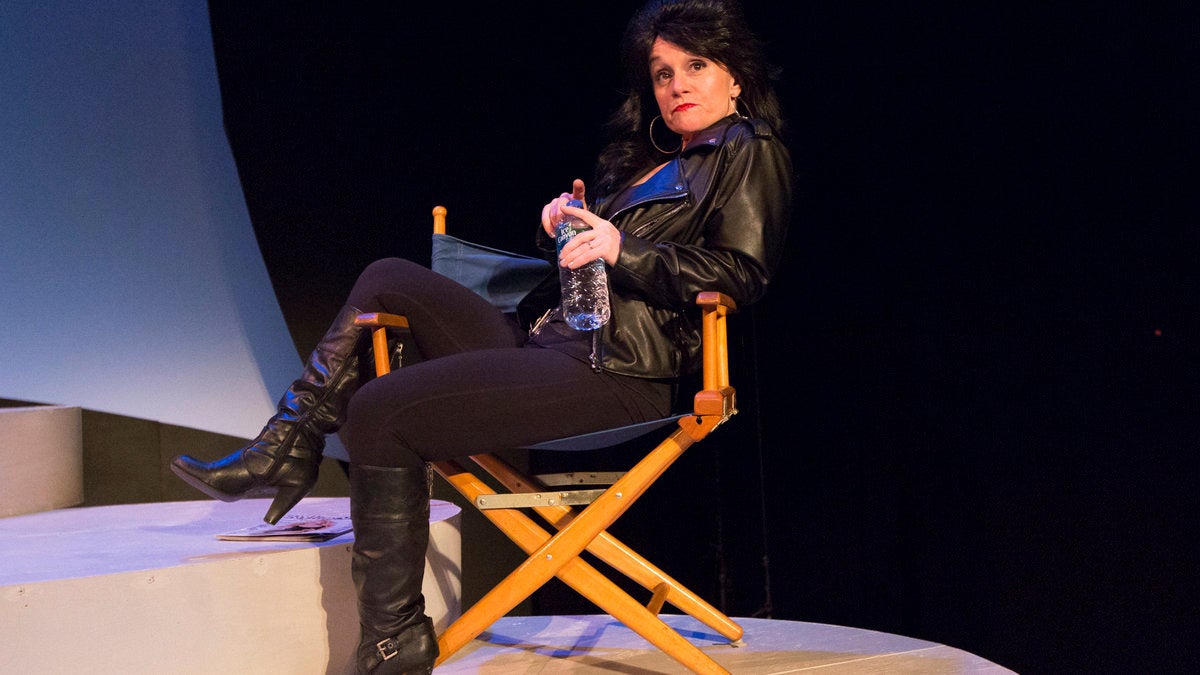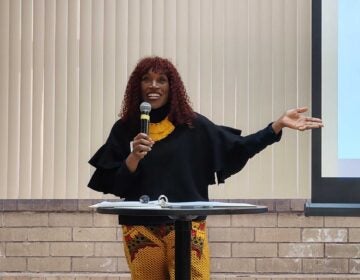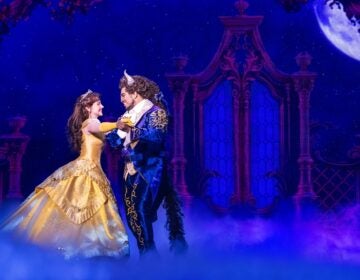Review: Looking at ‘Rizzo’ through many lenses
Listen
Jennifer Childs as once-popular rock star Sierra Mist
The run of the play “Rizzo” was extended before it even opened on Wednesday, and why not? If any play is tailored to people who lived or worked in Philadelphia from the mid-’60s on, it’s Bruce Graham’s “Rizzo,” in a superb production at Philadelphia Theatre Company.
Last season, the play by Philadelphia-based playwright Bruce Graham had a solid world premiere from Theatre Exile inside the top-floor theater at Christ Church Neighborhood House. Performances were packed. Such is the continuing lure of the larger-than-life Frank L. Rizzo, the police commissioner, then mayor, who died in 1991.
So in a smart move, Joe Canuso – the founder of Theatre Exile and director of the show – contacted Philadelphia Theatre Company chief Sara Garonzik. Would she be interested in remounting the Theater Exile production on the larger stage of the company’s home, the Suzanne Roberts Theatre?
She was.
The result feels like a bigger production on Colin McIlvaine’s set with a rowhouse façade to one side, a constant reminder of a Philadelphia with or without Rizzo. The play is essentially the same as the original but like Rizzo himself, now big in stature. I don’t remember there being a line from Rizzo in the original production about how together we can make Philadelphia great again, and it does get a chuckle. But if Graham added it this time around, it’s unnecessary. You don’t need to be taken by the hand to notice the similarities between Rizzo and Donald Trump on law-and-order while watching “Rizzo.” Even at that, Rizzo was more refined and real, and not all about Frank Rizzo.
Which brings up the point: Just what was Rizzo about? Graham’s play answers this by letting you make up your mind, and never coming down on any side. The play is adapted from Sal Paolantonio’s book “Rizzo: The Last Man in Big City America,” also a well-rounded work. Paolantonio, now an ESPN correspondent, was an Inquirer reporter who covered Rizzo and, in this telling, was never intimidated by him.
He’s played in “Rizzo” as an unflappable journalist by a poker-faced and excellent Damon Bonetti. Rizzo is portrayed by one of the city’s most versatile actors, Scott Greer, who was impressive in the original production and is an even more genuine Rizzo in this one. Greer doesn’t imitate the man; he puts his own spin on Rizzo by showing him as an all-around human, in addition to the blustery side we know from sound bites. In doing so, Greer reflects not just Rizzo, but his aura.
The rest of the cast is well up to the task: Paul L. Nolan, perfect as Rizzo’s go-to guy Marty Weinberg; Amanda Schoonover as his wife Carmella and in other roles, and Steven Wright, Robert DaPonte and William Rahill as figures visible in Rizzo’s time and as everyday Philadelphians.
Some might see Graham’s failure to take a side as a fault of the play – Rizzo was a flash-point for love or for hate. But sinners and saints are often embodied in a single person. I rode the Broad Street line yesterday under North Philadelphia, where the late civil-rights leader Cecil B. Moore was always out and about, and always out vocally about Rizzo’s super-belligerent tactics that made the city’s black community despise him. As I was thinking about that, I was sitting on a SEPTA subway car, one of the current fleet that Rizzo had made it a priority to purchase because we had all been riding dilapidated rattle-buckets from decades back. He was bad for the city? He was good for the city? Either way he was, at root, all about the city.
So you have here The Complete Rizzo – the conniver, the bully, the vengeful leader, the guy who jumps to help a black neighbor who’s been the victim of neighborhood prejudice, the mayor who threatens to punch a reporter and whose favorite description of the press’ efforts is “vendetta,” the charmer and jokester, fixer and disrupter. It’s frequently documented by news pictures or headlines in Christopher Ash’s projection design. But I’m sure it’s also documented in the memories of the audience, jogged by portrayals of Moore, Weinberg, Rizzo’s nemesis Shelly Yanoff (she started a recall campaign), Democratic boss Peter J. Camiel and others.
Rizzo is a history play, more history than play to be sure. That’s why it works. It doesn’t have an urgent plot, although Graham tries with limited success to give it one, about a young police officer who can help Rizzo out of a jam after he’s shot off his mouth on TV with allegations about his opponent in a GOP mayoral primary. Rizzo eventually switched from the Democratic party to seek a third mayoral term, but you knew that already.
In fact, if you see “Rizzo” you probably knew it all already, and no one need impose a plot on the play to make it work. Rizzo is his own plot. The triumph of the play is that it forces you to stand back a quarter century after Rizzo’s death and take a fresh look at the man. And understand how you perceive him now. And maybe even why.
—“Rizzo,” a Theatre Exile production presented by Philadelphia Theatre Company, has been extended through Oct. 23 at the Suzanne Robert Theatre, Broad and Lombard Streets. 215-985-0420 or philatheatreco.org.
WHYY is your source for fact-based, in-depth journalism and information. As a nonprofit organization, we rely on financial support from readers like you. Please give today.




